STEP 5: The Liniear Motion System - Hambrew
Main menu:
STEP 5: The Liniear Motion System
CNC \ 3D Printer > Builder's Guide
CNC Linear motion: Everything you need to know
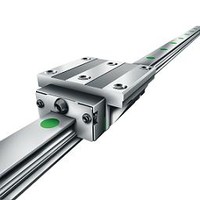 The linear motion system plays a vital role in any linear CNC machine, and CNC routers are no exception. Without these systems coupled with a drive system, a CNC router would be of little use.
The linear motion system plays a vital role in any linear CNC machine, and CNC routers are no exception. Without these systems coupled with a drive system, a CNC router would be of little use.The LM system is responsible for three primary tasks.
1) Support Machine Components
2) Guide the machine in a precise linear motion with minimal friction
3) Support secondary loads (Torque, Lateral Loads, etc)
A LM system is composed of some type of linear bearing and the linear bearing guides. There are a number of types of bearings and guides, each with advantages and disadvantages. Because of the importance of this system, it is vital for a buyer a builder to be knowledgeable about the LM components.
For the Buyer
The linear motion system can make or break a machine. For people buying new CNC routers today, there should be little concerns regarding these components. The quality and performance of linear motion slides have drastically improved over the last few years. Almost all of the new CNC router machines are using quality linear bearing systems.
This holds true for mid-range to high-end models. . If you are buying hobby CNC routers or low end machines, it is still important for you to be able to identify quality systems. Some manufacturers do not specify what types of components are installed and you should know how to identify faulty systems.For those interested in buying a used system, you need to know what types of linear system are installed and be able to identify faults or at least know the right questions ask.
It can cost $10,000 or more to replace a full set of linear bearings (depending on the system). If the system is older, the companies may no longer sell the parts. If you must replace a part you could be dead in the water. So it is important to be able to identify the components, know what faults to look for, and know whether or not the replacements are still in production.
For the Builder
The LM system can be one of the most expensive and difficult features of a machine. That is why it is imperative to get it right the first time. If you are here following the step 3 in the builder's guide then I suggest your read through all the sections and not just the section on building your own.
This guide will go through the many options you have for linear systems. It will discuss advantages and disadvantages of each and also show you how to build your own if you so choose. It will also include information on how to mount rails, linear shafts, and much more, including money saving tips and tricks. If you have any questions regarding LM systems, dont hesitate to contact us.
Sections
Linear Motion Systems Overview
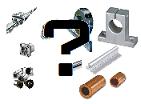
This Section covers:
Categories of LM systems
Rating and Terminology
How LM systems work
Etc.
Rails and Guide Blocks
This Section covers:
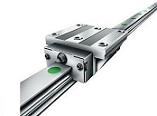
How rails and guide blocks work
Terminology
Types and features
Manufacturers
Where to Buy and Buying Tips
Etc.
Rods and Bushings
This Section covers:
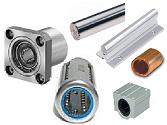
How rods and bushings work
Supported and Unsupported shaft
Shaft types and features
Plain and ball bearing bushings
Manufacturers
Where to Buy and Buying Tips
Etc.
V-Groove Wheels and Track Rollers
This Section covers:

How V-groove wheels and track rollers work
Types and features
Manufacturers
Where to Buy and Buying Tips
Etc.
Homemade Linear Motion Systems
This Section covers:
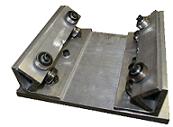
Homemade LM systems overview
Skate bearing systems
Plain Bearing systems
Linear Surfaces
Mounting Linear bearing rails
Linear Rods
Other Linear Bearing Systems
Etc.